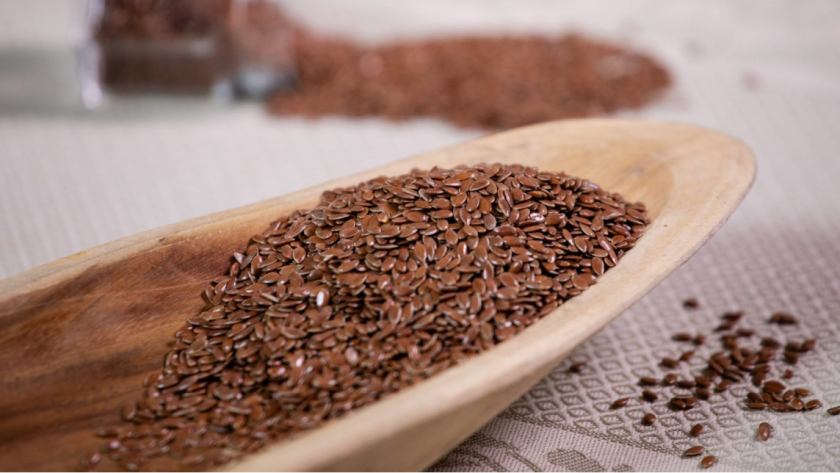Flax Seeds are indeed a superfood that can help you stay fit and active in this busy life. It is full of nutritious values and its health benefits span from promoting hair growth to fighting cancer cells in the body.
At the same time, Flaxseeds have long been a part of Ayurveda. Its active components like Omega-3 fatty acids, fiber, and protein help in weight loss and reduce the chances of cardiac arrest and heart attack.
That’s not all, this miraculous superfood can be consumed easily, as it is equally delicious. You can add it to your morning smoothie, homemade veggie burgers, pancake batter, and even overnight oats. So, if you’re planning to add Flax Seeds to your diet, read this article first.
Top 10 Flax Seeds Health Benefits
#1. Rich in Nutrients
Flaxseed is among the oldest crops in the world. It comes in two varieties, brown and golden, both of which have the same nutritional value.
A single serving offers a generous amount of protein, fiber, and omega-3 fatty acids, as well as several essential vitamins and minerals.
One tablespoon (10 grams) of ground flaxseed has:
- Calories: 39
- Carbs: 3 grams
- Fat: 3 grams
- Fiber: 3 grams
- Protein: 1.3 grams
- Thiamine: 10% of the Daily Value (DV)
- Copper: 9% of the DV
- Manganese: 8% of the DV
- Magnesium: 7% of the DV
- Phosphorus: 4% of the DV
- Selenium: 3% of the DV
- Zinc: 3% of the DV
- Vitamin B6: 2% of the DV
- Iron: 2% of the DV
- Folate: 2% of the DV
Flaxseed has a high concentration of thiamine, a B vitamin that is crucial for energy production and cell function. It also provides a lot of copper, which supports brain development, immune health, and iron metabolism.
#2. Abundant in Omega-3 Fatty Acids
Flaxseed is a great source of alpha-linolenic acid (ALA), a kind of omega-3 fatty acid that is important for heart health and is mainly found in plant foods.
ALA is one of the two essential fatty acids that you need to get from the food you eat since your body can’t make them. Animal studies indicate that the ALA in flaxseed may help lower inflammation and stop cholesterol from building up in your heart’s blood vessels.
A recent study in 10,000 people linked increased ALA intake to lower cholesterol levels and a reduced risk of ischemic heart disease — which is caused by narrowed arteries — and type 2 diabetes.
#3. Cancer Prevention
Flaxseed has a high amount of lignans, which are plant substances that can help fight cancer. This seed has more lignans than any other plant food, from 75 to 800 times more.
Some research suggests that eating flaxseed can lower the chance of getting breast cancer, especially for women after menopause.
Flaxseed also seems to protect against other types of cancer, such as colon, skin, blood, and lung cancer, according to animal and lab studies. However, more human studies are needed to confirm this.
#4. Fiber Content
One tablespoon (7 grams) of ground flaxseed has 2 grams of fiber, which is about 5% and 8% of the daily amount that men and women need, respectively.
Flaxseed has both soluble and insoluble fiber, which are good for your gut and bowel movements. The bacteria in your intestines break down these fibers and make them beneficial for your health.
Soluble fiber holds water in your intestines and makes digestion slower, which can help control blood sugar and cholesterol levels. Insoluble fiber makes the stool bigger, which can prevent constipation and make bowel movements easier.
#5. Improve Cholesterol Profile
Flaxseed can also benefit your cholesterol profile. A study of one month in people with peripheral artery disease found that consuming 4 tablespoons (30 grams) of ground flaxseed daily lowered LDL (bad) cholesterol by 15%.
Another study of 12 weeks in 112 people with hypertension showed similar results, revealing that 4 tablespoons (30 grams) of flaxseed daily caused significant decreases in body mass index (BMI), total cholesterol, and blood pressure.
These effects may be related to the fiber in flaxseed, which attaches to bile salts before being eliminated by your body. To replace these bile salts, cholesterol is drawn from your blood into your liver, resulting in lower levels
#6. Lower Blood Pressure
Flaxseed is well-known for its ability to reduce blood pressure levels. A review of 15 studies discovered that adding flaxseed products, such as flaxseed powder, to your diet may significantly lower both systolic and diastolic blood pressure – the upper and lower numbers on a reading, respectively.
This seed may be particularly beneficial for those with high blood pressure levels. In fact, a small, 12-week study demonstrated that taking 4 tablespoons (30 grams) of flaxseed per day lowered blood pressure in those with high levels.
#7. Helps in Maintaining Blood Sugar Levels
Flaxseed may help you keep your blood sugar levels in check and improve your blood sugar control. A review of 25 studies found that eating whole flaxseed may lower blood sugar and prevent insulin resistance, a problem that makes it hard for your body to use blood sugar effectively.
This effect may come from the soluble fiber in this seed. Studies show that soluble fiber slows down the uptake of sugar in the blood, which may lower blood sugar levels.
Flaxseed may be especially useful if you have type 2 diabetes. Remember that flaxseed works better for blood sugar control when it is whole rather than in oil form. This is because flaxseed oil does not have fiber.
#8. Support your Weight Management
Flaxseed may also help you manage your weight. An older study showed that a drink with flax fiber tablets that had 2.5 grams of soluble fiber made people feel less hungry and less eager to eat.
This may be because soluble fiber delays digestion and makes you feel full, which may help you if you want to lose weight.
A large review of 45 studies also found that adding flaxseed to your diet led to significant decreases in body weight, BMI, and belly fat.

#9. Fight Inflammation
Flaxseeds have two powerful compounds that can help lower inflammation, which is linked to diseases like Parkinson’s and asthma. These compounds are called ALA and lignans. They work by blocking the substances that cause inflammation in the body. Studies have shown that ALA can reduce inflammation in humans, and lignans can lower the levels of inflammatory proteins in a lab setting.
#10. Boost Digestion
Flaxseeds are rich in both kinds of dietary fiber- soluble and insoluble. Both kinds of fiber can help make the stool bigger and easier to pass. Soluble fiber helps make the stool softer, while insoluble fiber helps push the waste out of the gut and improve bowel movement.
Eating flaxseeds every day can help people who have constipation and irritable bowel syndrome. But they have to drink plenty of water throughout the day when they eat flaxseeds.
Conclusion
We hope you enjoyed learning about the amazing health benefits of flax seeds. These seeds are versatile and nutritious. You can eat them whole or as flaxseed oil. You can also consume them on your salad or blend them in your smoothies.
However, to get the best results from these seeds, you need to consume them properly. Many experts suggest that ground flaxseeds are better than whole flaxseeds because they are easier to digest. Also, you should limit your intake to one tablespoon of flaxseeds per day.
FAQs
What are the Benefits of Flaxseed?
The benefits of flaxseed include improved digestion and relief from constipation. It can also help lower LDL or bad cholesterol levels and total blood cholesterol, which reduces the risk of cardiac diseases.
Can you Eat Flax Seeds Every day?
While there is no ideal recommendation for daily flaxseed intake is available, you should still consume it in moderation. Consider taking 1-2 tablespoons of flax seeds every day. On tbsp of flaxseeds contain 2 gms of polyunsaturated fats, 37 calories, omega-3 fatty acids, 2 gms of dietary fiber, and 0.5 gms of monosaturated fats.
Who can Eat Flax Seeds?
Flaxseed is likely safe for most adults. Adding flaxseed to the diet might increase the number of bowel movements each day. It might also cause side effects such as bloating, gas, stomachache, and nausea.
Is Flaxseed Good for Hair?
The fatty acid content of flaxseed gel helps in retaining the fluid, which aids in keeping hairs glossy and silky.
Is Flaxseed Good for Skin?
Yes, flaxseed is beneficial for the skin. It’s packed with omega-3 fatty acids and antioxidants that enhance skin hydration and elasticity, prevent acne, soothe skin irritation, and soften fine lines.
Is Flaxseed Good for Females?
Absolutely, flaxseed is beneficial for females. It helps maintain hormonal balance, regularizes menstrual cycles, increases fertility chances, and alleviates menopausal symptoms.
Can I Eat Flax Seeds Directly?
While you can eat flax seeds directly, consuming them ground or milled is recommended for better digestion and nutrient absorption.



